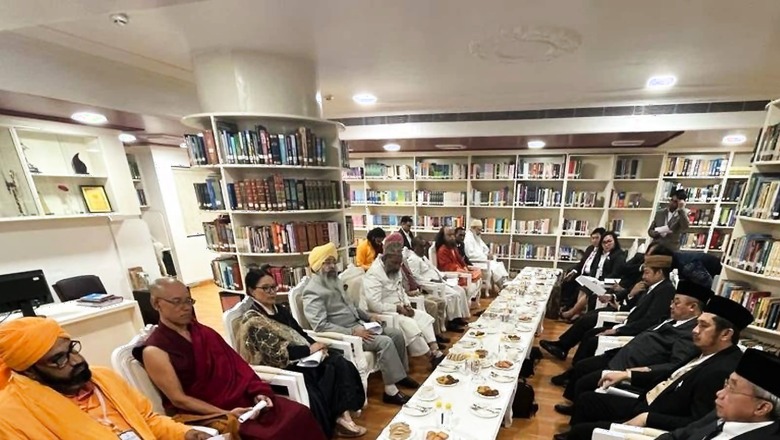
views
Ulemas and other religious leaders of India and Indonesia agreed on the need to work together to develop common narratives on de-radicalisation, according to a joint statement issued after their day-long deliberations on Tuesday.
In a unique initiative, a delegation of ulemas and other religious leaders from Indonesia accompanied Mohammad Mahfud MD, coordinating minister for political, legal and security affairs, who is on a visit to India on the invitation of National Security Advisor Ajit Doval.
Doval had extended the invitation to Mahfud while visiting Indonesia to attend the second India-Indonesia Security Dialogue on March 17 in Jakarta.
Accepting the invitation to visit India, Mahfud, the Indonesian counterpart of NSA Doval, had expressed the wish to bring a delegation of ulemas and leaders of other faiths in Indonesia to India during the visit where they can interact with their Indian counterparts in a more “formal setting”, officials have said.
The India Islamic Cultural Centre organised a dialogue on the role of ulema in fostering a culture of interfaith peace and social harmony in India and Indonesia.
The dialogue is aimed at bringing together Indian and Indonesian ulemas and scholars who can take forward cooperation in promoting tolerance, harmony and peaceful coexistence, Doval said in his opening address at the conference.
“Contemporary challenges of religious radicalisation and extremism in India and Indonesia were discussed along with the need to counter disinformation and propaganda that can impede peaceful coexistence among the followers of different faiths,” the statement said.
Noting the key role of ulemas and other religious leaders as well as education in countering radicalisation and extremism, the participants agreed on the need to work together to develop common narratives on de-radicalisation, it said.
The discussions were spread across three sessions — Islam:continuity and change, Harmonising Inter-Faith Society: Practice and Experience; and Countering Radicalisation and Extremism in India and Indonesia. Former Union minister M J Akbar and Lt. Gen. Syed Ata Hasnain (Retired) and Akhtarul Wasey, Chairman of Khusro Foundation, addressed the gathering from the Indian side. Indonesian Ulema Masykuri Abdillah, M. Cholil Nafis and Abdul Moqsith Ghazali besides Abdul Mu’ti and M Zaitun Rasmin addressed their respective sessions. “The religious leaders agreed that a better understanding among different faiths is a constructive element in the efforts to build harmonious societies. The participants denounced all hate speech, prejudice, propaganda, demonisation, violence, conflict and condemned the misuse of religions for these ends,” the statement said.
The religious leaders of both countries with huge Muslim populations — Indonesia having the largest Muslim population in the world and India third largest — emphasized the need to contribute all efforts possible towards building mutual understanding, trust, and respect in order to build secure, peaceful, and prosperous societies, it said.
“The ulemas also shared views on the experience and practice of Islam in multi-religious societies like India and Indonesia. They appreciated the prevalence of religious freedom, pluralism, and equality before the law in both societies,” it said. Earlier, Doval in his opening address said the ulemas have a leading role in educating the people on the original tolerant and moderate principles of Islam and countering radicalisation and extremism with progressive ideas and thought.
Underlining the threat posed by radicalisation, he said opposition to extremist and terrorists should not be painted as a confrontation with any religion.
Emphasising the important role of ulemas in Islamic society, Doval said the aim of the discussion is to bring together Indian and Indonesian ulemas and scholars to promote tolerance, harmony and peaceful coexistence which will bolster the fight against violent extremism, terrorism and radicalisation.
Urging the need to develop a common narrative on de-radicalisation, Doval said in a democracy there is no place for hate speech, prejudice, propaganda, demonisation, violence, conflict and misuse of religion for narrow ends.
Read all the Latest India News here

















Comments
0 comment